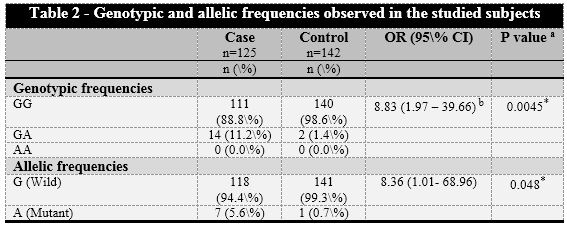Factor V Leiden (G1691A) mutation in Yemeni subjects with thrombophilia
Main Article Content
Abstract
Abstract: Factor V Leiden (G1691A) mutation is a significant biomarker for the evaluation of tendency for venous thrombosis. The objective of our study was to investigate the association between the Factor V Leiden (G1691A) mutation and thrombophilia in Yemeni patients residing in Sana'a City. Methods: The study included 267 subjects (125 thrombophilia patients as cases, and 142 healthy subjects as controls) who were genotyped using the Single Nucleotide Polymorphism (SNP) Genotyping Assay (FVL Real Time PCR Kit), and the genotypic and allelic frequencies of the factor V Leiden (G1691A) mutation were calculated. The laboratory data of the patients and controls were reviewed and analyzed in Aulaqi specialized medical laboratories. \ Results: Factor V Leiden (G1691A) mutation was present in 11.2 \% of all cases (heterozygotes, GA: 10\%, homozygote mutant, AA: 0\%) and 1.4 \% of all control subjects (heterozygotes: 1.4 \%, homozygote mutant: 0\%). The prevalence of heterozygote (GA) genotype for Factor V Leiden (G1691A) mutation was significantly more frequent in the group of subjects with the thrombophilia than in the control healthy subjects, OR (95\% CI) = 8.83 (1.97 - 39.66), P= 0.0045). The Factor V Leiden (G1691A) mutation risk (mutant) allele A frequency was significantly associated with thrombophilia [OR (95\% CI) = 8.36 (1.01 - 68.96), P = 0.048]. Conclusion From this study, we conclude that the Factor V Leiden (G1691A) mutation is significantly associated with an increased risk of thrombophilia.
Downloads
Article Details

This work is licensed under a Creative Commons Attribution-NonCommercial-NoDerivatives 4.0 International License.

